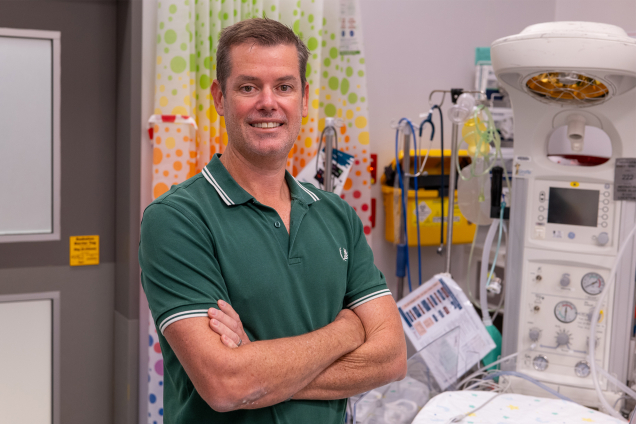
A diagnostic tool for sepsis in children is a step closer following a recent study involving clinician researchers from Gold Coast Health.
Emergency and Paediatric intensivist Dr Shane George led the study at Gold Coast Health and described the findings, published recently in Lancet Child and Adolescent Health, as a ‘game changer’.
“We found a gene signature that can help us predict whether a child will go into organ failure within 24 hours and also whether the infection is bacterial or viral,” he said.
“It’s a fantastic result that has come following the hard work of a large group of people across multiple locations in Australia and overseas.”
The study involved more than 900 critically ill children in emergency departments and intensive care units of four Queensland hospitals.
Researchers applied genetic sequencing to blood samples from these patients to develop the test, and they replicated the results successfully using data provided by European partners.
“We’ve found something that is potentially translatable to the point of care, and which could help a large number of children,” Dr George emphasised.
Sepsis is an abnormal response to an infection that can result in organ dysfunction and organ failure. It’s a life-threatening illness requiring intensive care support.
“Currently, we have no way to predict which children will experience this condition” Dr George explained.
“The child can present with a relatively mild infection and go on to develop sepsis.”
Due to the lack of diagnostic tools, clinicians must keep at-risk patients under close observation and prescribe antibiotics as a precautionary measure – even though patient may not be suffering a bacterial infection.
“As well as predicting which children will get sick with sepsis and require aggressive management, this new test also tells us whether the infection is viral or bacterial – that means we can stop giving antibiotics to children who do not need them.”
The next step for the researchers is to develop a timely, point-of-care test using the new method, and talks are already underway with commercial partners to embark on this next stage.
The Gold Coast Hospital Foundation provided the seed funding for the study, and Dr George thanked the Foundation team for making it happen.
“Without that funding, we wouldn’t have been able to secure the large volume of funds needed to run the study in Australia and internationally, he said.
“It was instrumental in starting the project, and it certainly would not have been possible without the support.”
Additional funding was secured from the Emergency Medicine Foundation and the Medical Research Futures Fund (MRFF).
The research was led by Professor Luregn Schlapbach from the UQ Centre for Child Research Associate Professor Lachlan Coin from UQ’s Institute for Molecular Bioscience. Several Gold Coast Health clinicians, including Dr George, are co-authors of the study.



